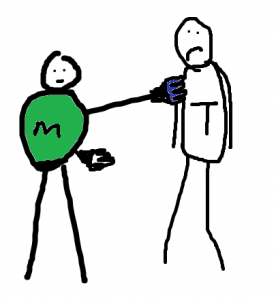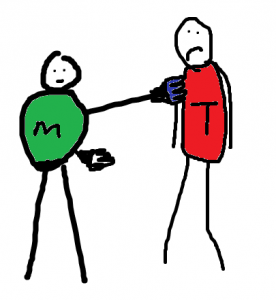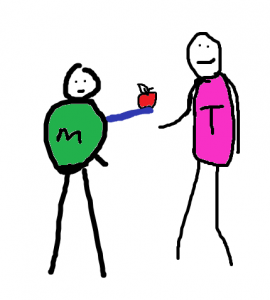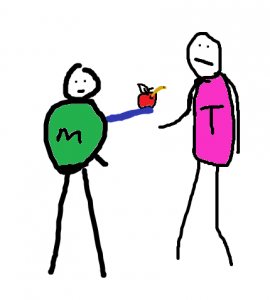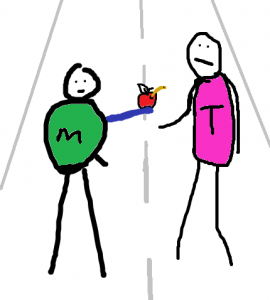Odd Gramatical Terms in Dutch Grammar – Pt. 1: Nouns Posted by Sten on Apr 11, 2016 in Dutch Grammar, Dutch Language, Dutch Vocabulary
If you have studied any language, or even just English, you have come across terms for the types of words and word combinations in the language. You might have also come across the widespread Latin terms for cases: nominativus, accusativus, dativus, genitivus, or even an ablativus. This is to identify the role of nouns in a sentence. These will be discussed in this first post.
There are also designations for verbs, for example infinitivus or imperativus. In many languages, these terms have been modified to make better understandable what these terms refer to. These will be discussed next week. The week after that, there will be a little test for you to try out and see how good you are at this!
In the Netherlands, they came up with a wide range of them. I personally did not find them to be of such great help in school, but nonetheless they are an integral part of learning Dutch. Why? If you know how a sentence is put together, what belongs where, if you have a structure to hold on to, it is much easier for you to understand the weird structure Dutch can have sometimes.
Here is a list of the most common terms and their English counterparts, with examples. In parentheses after the translation (= “…”) is the literal translation of the Dutch words to English, to make their meaning clearer.
First, here are a few necessary important terms for sentence formation.
Sentence – zin
Main clause / Independent clause – hoofdzin
Subordinate clause / dependent clause – bijzin
Period – punt
Comma – komma
Question mark – vraagteken
Exclamation mark – uitroepteken
Capital (letter) – hoofdletter
Parentheses / brackets – haakjes : I mean these two: ( )
Dash – streepje : I mean this one: –
1. Noun – zelfstanding naamwoord (= “independent name word”)
example: Mark
2. Verb – werkwoord (= “work word”)
example: to punch
The term werkwoord refers to the fact that a zelfstandig naamwoord cannot be doing something without a verb. It doesn’t work without it!
3. Subject (Nominativus) – onderwerp (= “subject”)
example: Mark punches Tom.
The onderwerp is the literal translation of subject. It refers to the noun that the sentence is all about. Without the subject, it is unclear who does something. In this example, Mark punches, and is therefore the onderwerp.
4. Direct Object (Accusativus) – lijdend voorwerp (= “suffering object”)
example: Mark punches Tom.
This one makes sense – the suffering object. In the sentence Mark punches Tom, Tom is obviously suffering! That makes him the lijdend voorwerp. In the English term, it is more about how the verb affects the object – here, Tom is directly affected by it, and so he is the direct object.
5. Indirect Object (Dativus) – meewerkend voorwerp (= “collaborating object”)
example: Mark gives Tom an apple.
This one is a bit vaguer. The Latin term comes from the latin verb dare – to give. In the example sentence, the apple is being handled over here – poor apple! Obviously, the apple is the lijdend voorwerp. Also obviously, Mark is the onderwerp. But what is Tom? Right, the one that the apple is given to, the “collaborating object”. Without him, Mark would just not be able to give the apple – because to whom? He needs Tom to work with him here. So, Tom is the meewerkend voorwerp. In the English term, it follows the same logic as the direct object. Mark giving the apple indirectly affects Tom, as he is still affected by it, but not as directly as getting punched!
6. Adjective (Adjectivum) – bijvoeglijk naamwoord (= “additive name word”)
example: Mark gives Tom a rotten apple.
A Bijvoeglijk naamwoord, as its literal translation suggests, is a noun that adds something. In this case, it adds a property to the apple, a description. It adds information to a noun.
7. Adjuncts – Bepalingen (= “provision, determination”)
example: Mark gives Tom a rotten apple in the middle of the road.
A bepaling can be all kinds of stuff. It can for example be a bepaling van tijd (provision of time – when did something happen?), a bepaling van plaats (provision of place – where did something happen? – in the example, in the middle of the road). Important to know is that without the bepalingen, the sentence still makes sense and is grammatically correct.
This was a short overview of the most important grammatical terms in Dutch concerning nouns. If you want a more exhaustive list of Dutch terms, check this website. If you want a more exhaustive list of English terms, check this website. Tune in next week for grammatical terms of verbs! And some more Mark and Tom, of course.

Build vocabulary, practice pronunciation, and more with Transparent Language Online. Available anytime, anywhere, on any device.
About the Author: Sten
Hi! I am Sten, both Dutch and German. For many years, I've written for the German and the Dutch blogs with a passion for everything related to language and culture. It's fascinating to reflect on my own culture, and in the process allow our readers to learn more about it! Besides blogging, I am a German-Dutch-English translator, animator and filmmaker.





